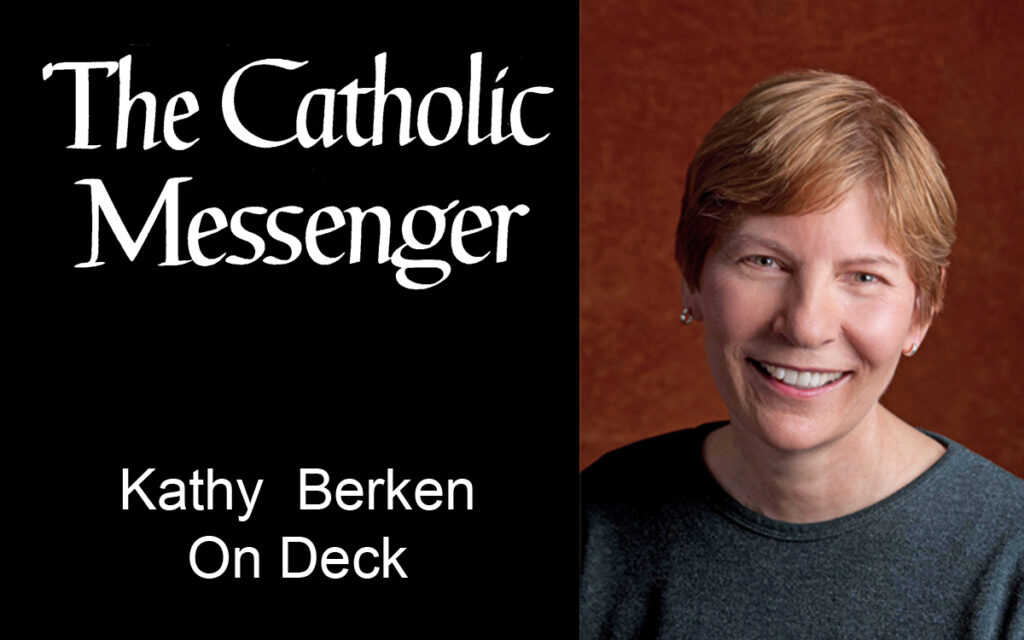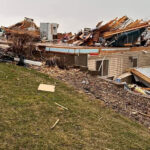By Kathy Berken
One of my favorite verses is: “For where your treasure is, there your heart will be also” (Matt 6:19). As we transition from Holy Week and the Triduum and into the Easter season, I’ve been thinking about what Jesus experienced in the 40 days in the desert.
 When I watched the BBC’s “Planet Earth” episode on the desert (April 2006), I’ll admit that it wasn’t the first place I wanted to explore with notable host David Attenborough. I had always had that cartoon image in my head of the desert showing the skull of a long-horned cow, a sad-looking cactus and the sun mercilessly beating down on some poor soul with his face in the sand. But the BBC’s extensive look into the world’s deserts shows something very different.
When I watched the BBC’s “Planet Earth” episode on the desert (April 2006), I’ll admit that it wasn’t the first place I wanted to explore with notable host David Attenborough. I had always had that cartoon image in my head of the desert showing the skull of a long-horned cow, a sad-looking cactus and the sun mercilessly beating down on some poor soul with his face in the sand. But the BBC’s extensive look into the world’s deserts shows something very different.
The show explains that deserts cover one-third of the earth’s land surface. “From space they appear lifeless but a closer inspection reveals . . . [that] deserts are . . . surprisingly varied, from Mongolia’s Gobi Desert, where wild Bactrian camels have to eat snow in lieu of water, to the Atacama in Chile where guanacos survive by licking the dew off cactus spines.”
The desert is a wilderness in that it is among the most undisturbed wild natural areas on the planet, “those last truly wild places that humans do not control and have not developed” (The WILD Foundation).
The images evoked by these descriptions offer a metaphor for our spiritual lives as we move into Easter. In our prayer lives, we may have experienced common desert moments of lifelessness, dryness and exhaustion but, as the BBC tells us, upon closer inspection, there’s more life there than we have ever imagined, often hidden under the surface or in remote areas. That’s where the treasure lies, in those wild uncontrolled, often unknown places of our hearts, where upon first glance, there’s nothing to see. It’s just dry and hot and deadly.
Finding life there is what makes it a treasure: dew on a cactus spine ready for a guanaco (similar to an alpaca), or snow for a Bactrian camel to find water.
Treasures in the wilderness of our lives may not be castles, nor 24/7 gourmet meals, nor buried chests filled with gold and silver. The treasures in the wilderness of our hearts and souls are often small and seemingly insignificant, such as the simple kindness of a stranger, sunshine after a rainy day or a note found in an old Bible with your grandmother’s handwriting.
If we were to ask the people of Ukraine about wilderness and treasure, you can bet they will tell you about life before the Russian invasion, about their homes, families, friends, traditions. They will tell you about their neighborhoods, churches and the places they gathered for fun. They might not have thought of them as treasures until they lost family members, friends, food, shelter and their homes. For the Ukrainian refugees living in the wilderness of unknowing, their treasures now are families who take them in, food, water, medical care, safety.
Yet, even with that, many people tell me that their desert/wilderness experiences with prayer offer no consolation and no treasure. I tell them to sit in that desert, imagine being surrounded by the wilderness, feel it deeply and just know that God is present in all of this, hidden just beneath the surface of what may appear as a wasteland. Be patient. Be kind to yourself. Be tuned to the possibility of finding a treasure. By not expecting a chest of gold and silver, you may find a glimmer of light in the darkness, a whisper in the silence, a feather brushing your hand, a glance, a smile, a good deed. It’s not a gourmet dinner, but a whiff of bread baking, the possibility of more to come. Be grateful for what appears. “For where your treasure is, there your heart will be also.”
(Kathy Berken is a spiritual director and retreat leader in St. Paul, Minnesota. She lived and worked at L’Arche in Clinton — The Arch from 1999-2009.)











